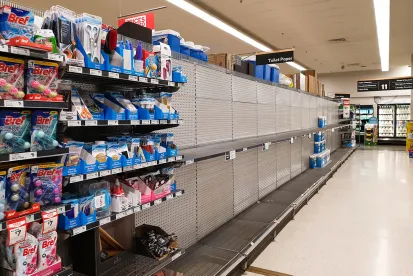As employers begin to reopen across the country, manufacturers are faced with unforeseen challenges and must quickly address new workplace safety issues, state orders, and the pressure to maintain operations in the midst of what economists have called the worst U.S. economy ever.
However, workplace safety, compliance with state orders, and continued operations are not mutually exclusive. In fact, a key to manufacturers continuing operations will depend largely on their ability to proactively maintain a safe workplace and address any potential exposure to COVID-19 as quickly as possible.
Many employers now provide gloves, face coverings, and personal protective equipment to employees. Manufacturing plants have modified work shifts (and workfloors) to comply with state and federal social distancing guidelines.
Still, many employers also are implementing more advanced tools to detect and prevent the spread of COVID-19. For example, to reduce the need for employees to touch doors, employers are installing motion-activated doors (or elbow-bars). In areas where appropriate social distancing is not possible, employers have installed clear barricades to protect employees from the risk of infection at their assigned workstation.
Some employers have implemented even more advanced technology. Thermal cameras can scan entire work areas to detect possible fevers or employee clusters that might violate social distancing orders.
Other manufacturers have distributed modified smart watches that would notify an employee when they are too close to another employee. If an employee is suspected or diagnosed with COVID-19, data collected through these smart watches can be used to trace all potential exposure and isolate exposed employees. This type of technology can assure that every potential exposure to COVID-19 is detected and addressed to prevent any further spread.
However, employers must review the impact new technology could have on their obligations under state and federal employment laws. With new technology comes new responsibilities. Depending on what information is collected and how it is stored, employers may have new and unexpected recordkeeping obligations. Employers must carefully review the technology that will work best for them and ensure compliance with local and federal laws.
While it is not clear how long social distancing protocols will be in place, it is clear that employers must prepare for a new workplace and develop new protocols to ensure employees are safe, and a business can survive.





 />i
/>i
